
14 Recommended Books for Arab American Heritage Month and Poetry Month
Contemporary Classics
 The Arab Apocalypse by Etel Adnan (1989)
The Arab Apocalypse by Etel Adnan (1989)
This is one of the contemporary classics of Arab American poetry. From XXXIX:
When the living rot on the bodies of the dead When the combatants’ teeth become knives When words lose their meaning and become arsenic When the aggressors’ nails become claws When old friends hurry to join the carnage When the victors’ eyes become live shells When clergymen pick up the hammer and crucify When officials open the door to the enemy When the mountain peoples’ feet weigh like elephants When roses grow only in cemeteries When they eat the Palestinian’s liver before he’s even dead When the sun itself has no other purpose than being a shroud
the human tide moves on…
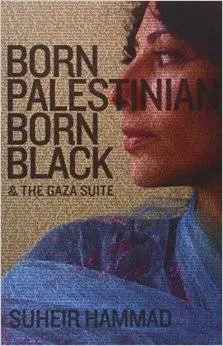 Born Palestinian, Born Black by Suheir Hammad (1996)
Born Palestinian, Born Black by Suheir Hammad (1996)
Hammad’s powerful first book of poems, originally published by Harlem River Press in 1996 and brought back into print by the excellent UpSet Press. You can read a talk between Nathalie Handal and Suheir Hammad, in which the poet—who straddles the worlds of written and spoken-word poetry—says:
“It is an association that I was born with. I don’t know what Palestine looks like, what Palestine tastes like, but it is something that is in your blood and we all carry ancestry around with us. As a child I was told that I was different from everyone else around me, I was Palestinian. I think that becoming a woman and understanding myself, being Palestinian becomes what I make it. I may not be like every other Palestinian and that is good. It is also something that I realize I have to claim for we are not living in a perfect society where we do not have to claim nationalities or religions.”
Award winners
 Tocqueville by Khaled Mattawa (2010)
Tocqueville by Khaled Mattawa (2010)
Mattawa has been awarded several Pushcarts, a Guggenheim Foundation fellowship, the Alfred Hodder Fellowship at Princeton University, and a MacArthur fellowship. Several of these prizes came after the publication of Tocqueville, an exploration of our global cultural mashups in which the title poem is a re-invention of Alexis de Tocqueville’s Democracy in America.
 the magic my body becomes by Jess Rizkallah (2017)
the magic my body becomes by Jess Rizkallah (2017)
Winner of the inaugural Etel Adnan Poetry Prize, by Lebanese American poet Jess Rizkallah, this collection “freely asserts gender, sexuality, and religious beliefs, while at the same time it respects a generational divide: the younger’s privilege gained by the sacrifice of the older, the impossibility of separating what is wholly hers from what is hers second-hand.”
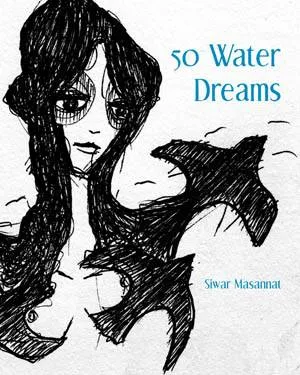 50 Water Dreams, by Siwar Masannat (2015)
50 Water Dreams, by Siwar Masannat (2015)
This is the auspicious debut of Jordanian writer and 7iber alum Siwar Massannat, winner of the Cleveland State University Poetry Center’s First Book Award. I’ll quote poet Ilya Kaminsky: “How rare and exhilarating it is, in our time, to find a book that is both wildly inventive and daring in its style and incredibly compelling in its content! 50 WATER DREAMS takes us on a book-long journey of Fadia and Ishmael and a mysterious horse that keeps the house company (‘horse that humanizes the house,’ ‘horse that may keep the house from dying’).”
 Sand Opera, by Philip Metres (2015)
Sand Opera, by Philip Metres (2015)
Winner of the 2013 Beatrice Hawley Award, Phil Metres gives us sharp, clipped narratives of the post-9/11 US. Also, the first section of the work, “abu ghraib arias” was published in 2011 as a chapbook and received the Arab American National Book Award. From the first section:
The Blues of Charles Graner the Christian in me knows it’s wrong but the corrections officer in me can’t help but love making a grown man piss himself
 The January Children, by Safia Elhillo (2017)
The January Children, by Safia Elhillo (2017)
This book won the Sillerman First Book Prize for African Poets. In her dedication, Elhillo writes, “The January Children are the generation born in Sudan under British occupation, where children were assigned birth years by height, all given the birth date January 1.”
Of the collection, Arab-American poet Lena Khalaf Tuffaha writes: “The January Children opens with a prayer in the cadence of a translated Quranic passage: ‘verily everything that is lost will be / given a name & will not come back / but will live forever.’ Safia Elhillo’s poems name loves and worlds even as they slip through our memories and our languages. And for that and the treasure of these poem, I send up a heartfelt Ameen.”
‘Old’ Favorites
 The Revolution Happened and You Didn’t Call, by Maged Zaher (2012)
The Revolution Happened and You Didn’t Call, by Maged Zaher (2012)
Most Zaher fans would probably choose his collection The Consequences of My Body (2016) or Thank You For the Window Office (2012), but I particularly enjoyed the heartbreaking humor of The Revolution Happened and You Didn’t Call, written in the wake of the January 2011 uprising.
In a city under heavy rebranding There are bearded men And lovers Walking to McDonald’s (The one next to the armored vehicle)
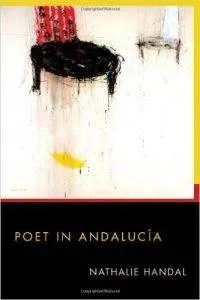 Poet in Andalucia, by Nathalie Handal (2012)
Poet in Andalucia, by Nathalie Handal (2012)
I’m fairly certain this is my favorite Nathalie Handal collection. As I wrote about this collection in a 2012 review, “Handal is particularly drawn to the shadows of Andalucía’s joint Islamic, Judaic, and Christian history.”
In “Alhandal y las Murallas de Córdoba,” “The past is here / the song of the Arabs here, / the song of the Jews, / the Romans, / the Spaniards, / and the phantoms.” It is clear why: Palestine is not mentioned, but it is everywhere. Palestine is in Murcia, in Toledo, in Córdoba, and in a dozen other places. The narrator of “The Thing about Feathers” does not name a country, but it is hard not to see Palestine: “I am seven / it is the day before our departure, / the day my father / gives me a notebook, / and I tell him, / this is where I’ll keep my country.”
Recent Releases
 Footnotes in the Order of Disappearance, by Fady Joudah (2018)
Footnotes in the Order of Disappearance, by Fady Joudah (2018)
I’m still reading this one, moving back and forth through it, hovering over the section written with Syrian poet Golan Haji, and then darting out again. Poems that fuse the language of contemporary medicine with that of poetic lyricism, as well as poems that re- and de-construct memory and history.
 Tunsiya Amrikiya, by Leila Chatti (2018)
Tunsiya Amrikiya, by Leila Chatti (2018)
This book came out this month, the editors’ selection from the 2017 Frost Place Chapbook Competition. From Chatti:
When referring to a suicide, we say she took her own life because we recognize a life
isn’t ours, not really, it’s a thing borrowed or worn for a short while
like a coat in winter, but it was August when she stole
her life in her own two hands, the sky sweat on everything, or wept, all metaphor—


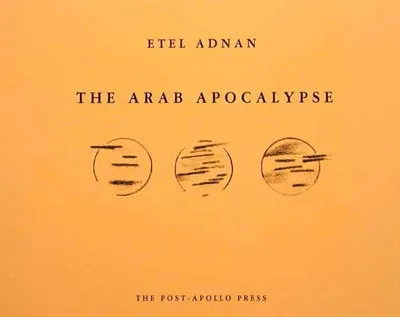 The Arab Apocalypse by Etel Adnan (1989)
The Arab Apocalypse by Etel Adnan (1989)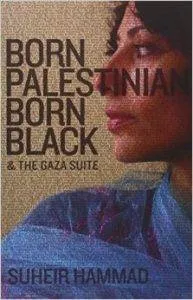
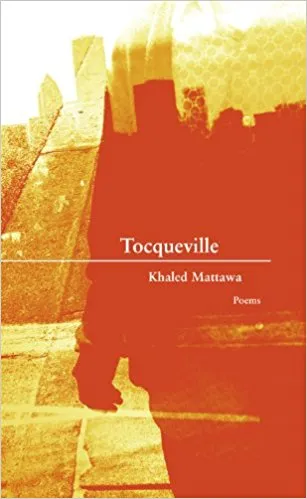 Tocqueville by Khaled Mattawa (2010)
Tocqueville by Khaled Mattawa (2010)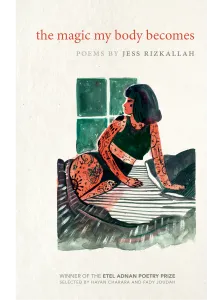 the magic my body becomes by Jess Rizkallah (2017)
the magic my body becomes by Jess Rizkallah (2017)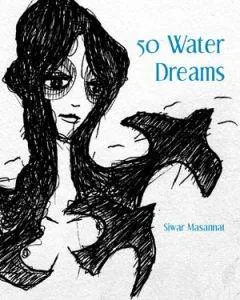
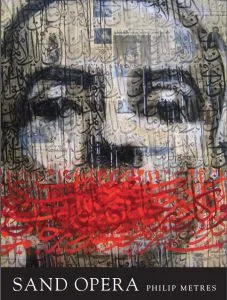 Sand Opera, by Philip Metres (2015)
Sand Opera, by Philip Metres (2015)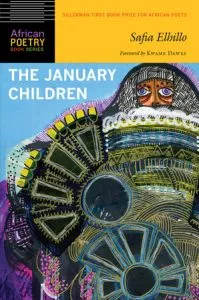 The January Children, by Safia Elhillo (2017)
The January Children, by Safia Elhillo (2017) The Revolution Happened and You Didn’t Call, by Maged Zaher (2012)
The Revolution Happened and You Didn’t Call, by Maged Zaher (2012)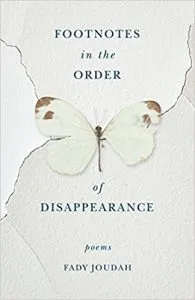 Footnotes in the Order of Disappearance, by Fady Joudah (2018)
Footnotes in the Order of Disappearance, by Fady Joudah (2018)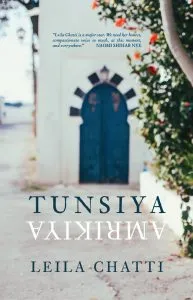 Tunsiya Amrikiya, by Leila Chatti (2018)
Tunsiya Amrikiya, by Leila Chatti (2018)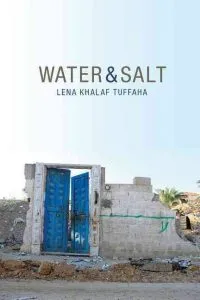 Water & Salt, by Lena Khalaf Tuffaha (2017)
Water & Salt, by Lena Khalaf Tuffaha (2017)









